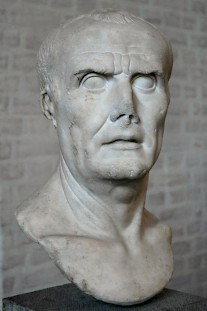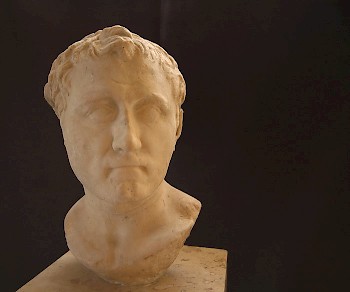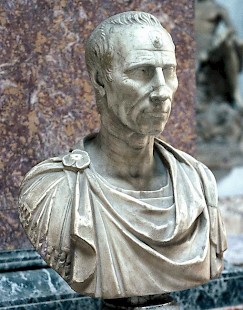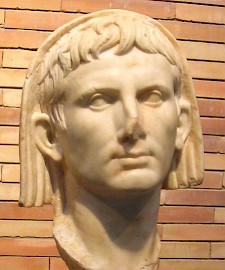Livy (2)
Titus Livius or Livy (59 BCE - 17 CE): Roman historian, author of the authorized version of the history of the Roman republic.
Scope of the History of Rome
The History of Rome from its foundation was a very, very large work. All in all, there were 142 books. Of course, these were not real books in our sense, but scrolls, the length of which is identical to about 65 pages in a modern pocket book. The total size of Livy's work is, therefore, the equivalent of some 9,250 pages or 31 pocket books. He wrote all this in about 45 years, which means that every year, he published three-and-a-fifth scrolls or 205 pages. Even with a computer and a word processor, this is impressive. It is clear that Livy had to make use of earlier histories and did not have the opportunity to do additional research in archives. We will discuss the consequences of this lack of originality below.
What does Livy have to tell? Unfortunately, his work was too large to survive. A century after his death, an Epitome was published by Publius Annius Florus, and many people preferred this and similar abridged editions. As a consequence, few people cared about the originals. We still possess the books 1-10 and 21-45 and this is not likely to change (although surprise finds in the Egyptian desert or the Vesuvius area can never be completely be ruled out). Fortunately, the contents of the remainder (11-20 and 46-142) are known from a fourth-century excerpt, the Periochae. We can also deduce something of its nature from texts based on the original. For example, it is likely that Lucan's Pharsalia, a poem on the Roman civil wars in which Pompey the Great is the hero and Julius Caesar the villain, is based on Livy's History of Rome from its foundation.
The work was organized in pentads and decades, groups of five and ten scrolls. The first pentad deals with the origins of Rome until the summer of 386 BCE. (Or 390 according to the chronological system of Varro, which Livy did not use. Unlike many modern scholars, Livy understood its errors.) In the first book, he tells the legends of Rome as a kingdom; he continues with the establishment of the republic by Brutus and Valerius Publicola; and after an account of the difficult fifth century (books 2, 3, and 4), this part of the history culminates in a breath-taking account of the capture of Veii, the sack of Rome by the Gauls, and its second foundation under the auspices of Marcus Furius Camillus (book 5). The circle is closed.
This part of the History of Rome from its foundation was completed in c.26 (it mentions Octavian's new name Augustus but does not mention the closing of the temple of Janus in 25). It is clear that Livy presents Camillus, victorious in war and second founder of the city, as the alter ego of the emperor Augustus. It is interesting to note that Camillus is once called dux, a title that Octavian had also used.
The second part consisted of ten books, which dealt with the conquest of Italy. We possess the first half of this decade, Books 6 to 10. In the beginning, Rome is still recovering from the crisis, but it raises itself up by the support of Camillus. At the end of book 10, the Romans have defeated the Etruscans, Umbrians, Gauls, and Samnites at Sentinum (295 BCE). Although the story of the unification of the Apennine peninsula is not yet over - a new pentad will be needed - the decisive battle has been won by the personal sacrifices of famous Romans like Publius Decius Mus. Again, this is in line with the propaganda of Augustus.
The next five books of the History of Rome from its foundation is lost. Yet it is clear from the Periochae that this pentad was a continuation of Books 6-10. The second half of the unification of Italy involves wars against foreign powers, like king Pyrrhus of Epirus and Carthage. When Livy wrote at his average speech of three-and-a-fifth scrolls per year, he will have finished the decade on the conquest of Italy in c.24.
Just like the first fifteen books, the next group of fifteen consisted of a pentad and a decade. In the books 16-20, the first conflict with Carthage is described: the First Punic War, the longest and greatest military conflict in the ancient world. The Second Punic War, a conflict of lesser size, receives ten books - five dealing with the successes of the Carthaginian general Hannibal (including a splendid account of his crossing of the Alps) and five dealing with the successes of his Roman opponent Publius Cornelius Scipio. This lack of balance is explainable: it stems from Livy's most important source, the World History of Polybius of Megalopolis, who was fascinated by the figure of Hannibal and had not much to say about the earlier war.
When Livy continued his work in c.19 BCE, he suddenly became tired, if we are to believe the preface to the next pentad:
The sixty-three years from the First Punic War to the end of the Second have taken up as many volumes as the 488 years from the foundation of the city to the consulship of Appius Claudius, who began the first hostilities against the Carthaginians. And when this fact comes home to me, I feel like someone who has been introduced into shallow waters near the shore and is now advancing into the sea. I picture myself being led on into vaster [...] depths with every forward step. The task undertaken seemed to grow less with the completion of the early stages; now, in anticipation, it seems almost to increase as I proceed.note
That Livy at this stage had to face certain realities is also suggested by the fact that his digressions start to become shorter. He had to hurry.

The third group of fifteen books deals with the conquest of the eastern Mediterranean in the years 201-167. Here, three powerful kingdoms opposed Rome: Macedonia, the Seleucid empire in Asia, and the Ptolemaean empire of Egypt. In Books 31-35, we read how the Romans dealt with Macedonia and liberated Greece; in the next pentad, war is waged against the Seleucid king Antiochus III the Great; and in the last five books, the Macedonian kingdom is liquidated after the battle of Pydna. The climax is a Roman embassy to Alexandria, where Antiochus IV Epiphanes, who is about to conquer Egypt, is forced to return home. The reader who had reached this point, in c.14 BCE, knew that Rome how Rome had become a superpower.
The next decade (Books 46-55), now lost, mark the turning point in Roman history, according to Livy. Rome now has to behave like a superpower, but fails to live up to its responsibilities. At first, it is able to impose its will on struggling Ptolemaean princes, but in Book 48, everything starts to change. In the first place, the seeds of a new and unnecessary war are sown: the Third Punic War, which is provoked by the Romans and leads to the destruction of Carthage (in Book 51). According to most Roman historians, this removed a check on the Roman character. From now on, luxury and decadence became important, and the Romans lost their ancestral qualities. This is already shown in Book 48, in which general Servius Sulpicius Galba becomes a war criminal in Hispania, where a local leader named Viriathus punishes the Romans until Book 54 - when he is betrayed and murdered. At the same time, the Romans conquer Greece (Book 52). At the end of Book 55, the Roman legions for the first time see the Ocean (in Portugal) and the edges of the earth. This is the fitting end of a crucial decade. Livy reached this point in c.11 BCE.
The following decade (56-65) consists of two clearly divided pentads. The first deals with a new round of Spanish wars, which culminate in the capture of the Celtiberian capital Numantia. In Rome, the central theme is the struggle against the reforms proposed by Tiberius and Gaius Sempronius Gracchus. The battle in which the latter is killed means that the Romans sadly start to use full-scale violence against each other. Meanwhile, foreign enemies like the Numidian king Jugurtha and the Germanic tribes of the Cimbri and Teutones become very dangerous. It is likely that Livy presented their successes as the result of the moral collapse of Rome. (A reference to a speech on marriage by Augustus in Book 59 proves that this part was written after 9 BCE.) Book 65 was, if the Periocha is reliable, one big catalogue of Roman disasters.

This decade was probably published together with the next twenty-five books (66-90), which are dedicated to the conflict between two rivaling Roman statesmen: Marius and Sulla. The first five books deal with the rise of general Marius. In books 71-76, Livy deals with the Social War, in which the Romans have to fight against their own allies, which demand citizenship. After their victory, the Romans wage war against king Mithridates of Pontus, without being able to overcome him. General Sulla merely neutralizes the problem, returns to Italy and rules the country as a dictator. This part of the History of Rome from its foundation, which dealt with the problems caused by the divisions among the Romans and ended with the death of Sulla, was probably published at the beginning of our era. It cannot have been very uplifting reading. Although the books are now lost, we still possess the Periochae, from which we learn that Livy very frequently stated that political affairs were settled per vim, "with violence". Other stock phrases are avaritia and crudelitas, "avarice" and "cruelty"

Books 91-105 deal with the rise of Pompey, Crassus, and Caesar and must have been published in c.5. We learn how the young Pompey successfully fights against the rebel leader Sertorius in Hispania, allies himself to Crassus and becomes consul, and later fights against the Cilician pirates, Mithradates, and the Jews. (Go here for the story. Livy's description of the capture of Jerusalem was used by the Jewish historian Flavius Josephus.) In the last books, the creation of the First Triumvirate ("a conspiracy against the state by its three leading citizens"), and Caesar's sensational wars in Gaul are described. Book 105 ends with the campaigns on the other side of the Rhine and Channel. This climax suggests that Livy's message was that the Romans, if they could overcome their divisions, could achieve great things. It is interesting to note that there is a digression on the customs of the Germanic tribes in Book 104, which suggests that Livy used contemporary reports on the campaigns of the Roman generals Drusus and Tiberius.

The next decade deals with Caesar's coup d'état. Book 106 starts with the death of Julia, daughter of Caesar and wife of Pompey. From now on, the harmonious relations between the triumvirs are gone and disaster follows disaster. The Belgian leader Ambiorix defeats Caesar's legions, and the Parthian commander Surena defeats the soldiers of Crassus at Carrhae. In the Periocha of the next book, we read about civil strife in Rome, and Caesar's defeat at Gergovia. After he has been able to restore order (Book 108), the strained relations between Pompey and Caesar deteriorate, and civil war breaks out. Livy uses seven books to describe the successes of Caesar; the battle of Pharsalus in 48 BCE is the subject of Book 111. It contained a personal anecdote by Livy, who as a boy witnessed a seer who "saw" the battle, even though he was not at Pharsalus but in Padua. The decade ends with Caesar's fourfold triumph (Book 115). It was probably published in 8, and may have encouraged the Romans, who were suffering severe military setbacks in Illyricum.
In the hundred-and-sixteenth book, Livy describes how Brutus and Cassius assassinate Caesar (44 BCE). Livy's judgment of the dictator has survived: "It cannot be decided whether it was better for the commonwealth for Caesar to be born, or never to be born." (fragment 16). This pentad describes the war between Caesar's former supporter Mark Antony and his adopted son Octavian (the War of Mutina). This is much space for a period of two years, but Padua, where Livy born, was part of this war and he may have considered it to be more important than we do. Book 120 describes how the two rivals and Lepidus conclude the Second Triumvirate, an event that marked the beginning of the reign of Octavian. Livy published this pentad in c.10 and it is possible that he again stressed that rulers should work together, a theme that became increasingly important in the Augustean propaganda of this age. (At the same time, a temple was dedicated to Concordia.)

Now Livy had to deal with the triumviral years of Octavian, a violent period in which the man who was to give the world a new golden age, behaved like a criminal. Modern scholars have made much of the remark in the Periocha of Book 121 that the next books were published "after the death of Augustus". But we do not have to assume that Livy's treatment of the subject matter was too politically incorrect to be published. Probably, he just wanted to commemorate the reign of Augustus, who was the main character of the rest of his work. Several scholars have suggested that Book 133, in which Livy described the battle of Actium, was meant to be the original ending of the History of Rome from its foundation. If we assume that Livy still wrote three-and-a-fifth scrolls per year, he would have reached Actium at the time of the death of Augustus. No wonder that Livy wanted to record this fact in a preface.
In Books 121-133 he described the war of the triumvirs against Brutus and Cassius, culminating in the battle of Philippi (Book 124); Mark Antony's war against the Parthians (Book 128); Octavian's war against Sextus Pompeius and the fall of Lepidus (Book 129); the romance of Antony and Cleopatra; Antony's failed Parthian campaign (Book 130); the battle of Actium and finally the suicide of Antony and Cleopatra (Book 133).
Having reached this point, Livy had finished his work. He had told the history of Rome until the moment when he had started to write, believing that after the fratricidal civil wars an age of moral revival was possible. The Roman world had become more peaceful indeed, but he must have noticed that the republic, with its public debates, had changed into a monarchy, where decisions were taken by one man and his friends. Livy was not close enough to the emperor to know about the real policy-making and was therefore unable to produce anything like the preceding thirty-three books, in which he had described 24 years. After Book 134, the speed of his story almost quadruples: he describes 22 years in just nine books.
It is probable that he wanted to continue until Book 150 and the death of Augustus. The story was completely different from the preceding books and it is possible that Livy now lost interest in his story. It is likely that Book 134 started with the words of fragment 58:
I have now earned fame enough and might make an end, except that my restless mind feeds on the work.
So, Livy continued to write. The Periochae of the last books are extremely brief and do not suggest that they made exciting reading. It was not Livy's fault. The times had been changing. After all, the sad paradox of historiography is that only wars and catastrophes furnish materials for history. If the last books of the History of Rome from its foundation were boring, it was because Livy's own age was a fortunate one.